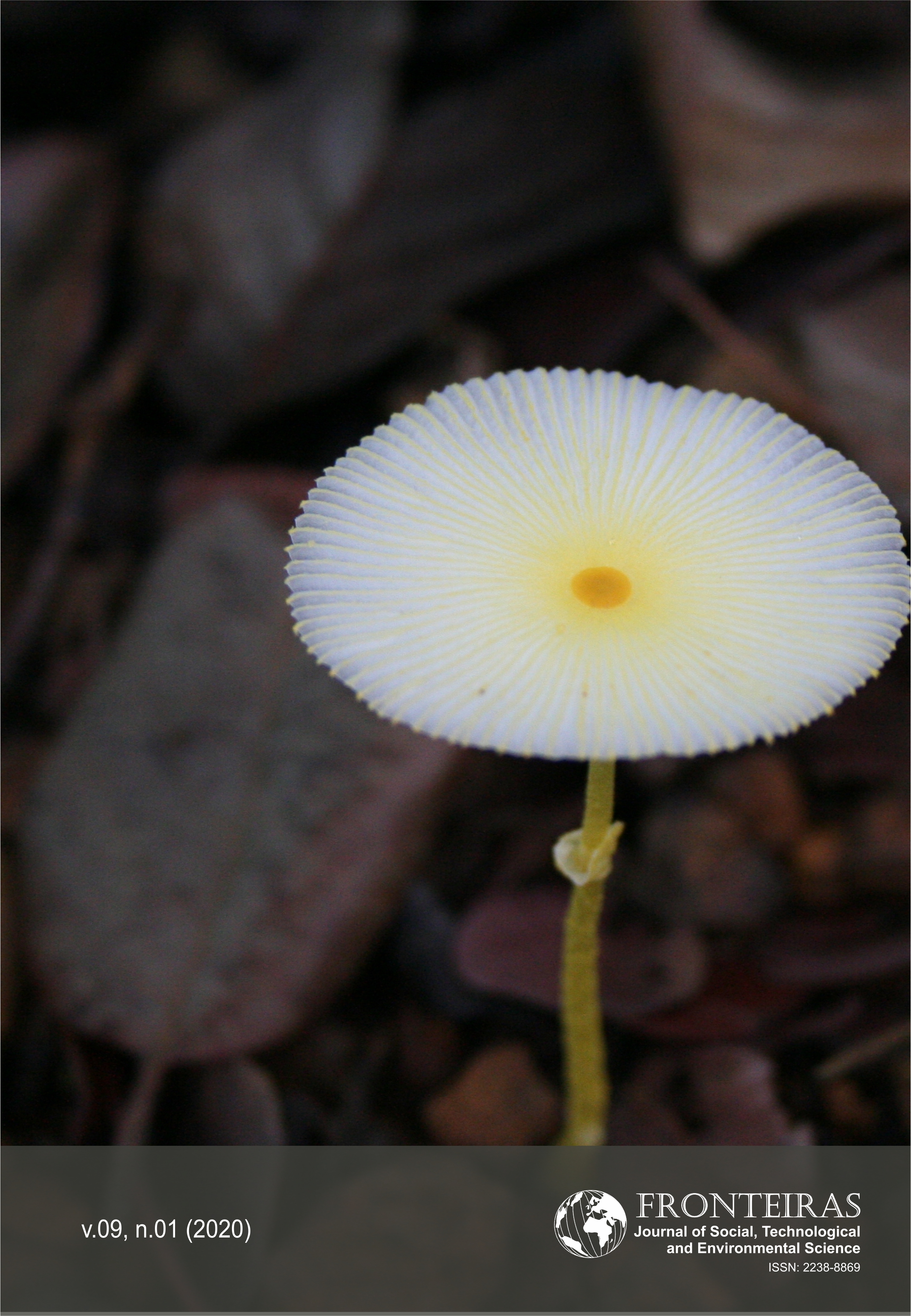Evaluation of the Impact of Solubilized Extract of Coffee Waste on the Germination of Lettuce Seeds
DOI:
https://doi.org/10.21664/2238-8869.2020v9i1.p414-423Keywords:
Environmental Impact, Ecotoxicity, Germination, Residues, EffluentsAbstract
Per capita coffee consumption in Brazil is estimated at 4.9 kg of roasted and ground coffee, which leads to a high generation of residual coffee grounds. The decomposition process promotes, among others, the formation of liquids. This study aimed to evaluate the environmental, ecotoxicological impact of the solubilized extract of coffee grounds on lettuce seeds. A completely randomized design with seven treatments with three replications was used. Ten lettuce seeds were placed in a Petri dish with filter paper substrate and moistened with 4.0 mL. equivalent to treatments. There was a negative effect of BCR extract on the germination rate but it was not possible to determine the LC50 dose with the tested treatments. Sublethal effect was observed from root growth of lettuce with increasing doses. The CEO was established on 0.1 mL treatment. Thus, it is evident that the species studied has low tolerance to the pollutant and that it presents itself as a potentially polluting substance.
References
ABNT. 2004a. NBR 10004. Resíduos Sólidos – Classificação. Brasil.
———. 2004b. NBR 10006. Procedimento Para Obtenção de Extrato Solubilizado de Resíduos Sólidos. Brasil.
———. 2004c. NBR 10007. Amostragem de Resíduos Sólidos. Brasil.
Brasil. 2009. “Regras Para Análise de Sementes.” Brasília: Ministério da Agricultura, Pecuária e Abastecimento - MAPA.
CONAB. 2018. “Acompanhamento Da Safra Brasileira - Café (v.5 n.1 - Primeiro Levantamento).” Brasília.
Costa Neto, Pedro Luiz de Oliveira. 1977. Estatística. São Paulo: Edgard Blücher.
Franco, Heider Alves, Gabrielle Marjory de Oliveira Martins, Yasmin Laureano Mussel, Shaiene Costa Moreno, Sérgio Thode Filho, and Mônica Regina da Costa Marques. 2017. “Ecotoxicidade de Lixiviado de Aterro Sanitário Na Germinação de Sementes de Alface (Lactuca Sativa L.) e Pepino (Cucumis Sativus L.).” Revista de Estudos Ambientais 19 (1): 36. https://doi.org/10.7867/1983-1501.2017v19n1p36-43.
Lacerda, C. F., J. Cambraia, M. A. Oliva, and H. A. Ruiz. 2004. “Influência Do Cálcio Sobre o Crescimento e Solutos Em Plântulas de Sorgo Estressadas Com Cloreto de Sódio.” Revista Brasileira de Ciência Do Solo 28 (2): 289–95. https://doi.org/10.1590/S0100-06832004000200007.
Miller, Jane C., and James N. Miller. 1993. Statistics for Analytical Chemistry. 3rd ed. Chichester: Ellis Horwood Ltd.
Mota, José Carlos, Mércia Melo de Almeida, Vladimir Costa de Alencar, and Wilson Fadlo Curi. 2009. “Características e Impactos Ambientais Causados Pelos Resíduos Sólidos: Uma Visão Conceitual.” In Anais Do I Congresso Internacional de Meio Ambiente Subterrâneo, 15. São Paulo: Associação Brasileira de Águas Subterrâneas - ABAS.
OECD/OCDE. 2003. “OECD Guideline for the Testing of Chemicals - Terrestrial Plant Test: Seedling Emergence and Seedling Growth Test.” Organization For Economic Cooperation and Development – OECD.
OIC. 2018a. “Consumo Mundial de Café.”
———. 2018b. “Produção Mundial de Café Pelos Países Exportadores.”
Oliveira, Alexandre Bosco de, Nara Lídia Mendes Alencar, José Tarquinio Prisco, and Enéas Gomes-Filho. 2011. “Accumulation of Organic and Inorganic Solutes in NaCl-Stressed Sorghum Seedlings from Aged and Primed Seeds.” Scientia Agricola 68 (6): 632–37. https://doi.org/10.1590/S0103-90162011000600004.
Ronco, Alicia, María Consuelo Díaz Báez, and Yolanda Pica Granados. 2004. “Conceptos Generales.” In Ensayos Toxicológicos y Métodos de Evaluación de Calidad de Aguas: Estandarización, Intercalibración, Resultados y Aplicaciones, edited by Gabriela Castillo, 17–22. IMTA, IDRC.
Silva, M.A., S.A. Nebra, M.J. Machado Silva, and C.G. Sanchez. 1998. “The Use of Biomassa Residues in the Brazilian Soluble Coffee Industry.” Biomass and Bioenergy 14 (5–6): 457–67. https://doi.org/10.1016/S0961-9534(97)10034-4.
Sobrero, María Cecilia, and Alicia Ronco. 2004. “Ensayo de Toxicidad Aguda Consemillas de Lechuga (Lactuca Sativa L.).” In Ensayos Toxicológicos y Métodos de Evaluación de Calidad de Aguas. Estandarización, Intercalibración, Resultados y Aplicaciones, edited by Gabriela Castillo, 71–80. México/Canadá: IMTC/IDRC.
Thode Filho, Sérgio, Leonardo Corrêa de Souza, Emanuele Nunes de Lima Figueiredo Jorge, Marcelo Fonseca Monteiro de Sena, and Heider Alves Franco. 2017. “Evaluation of the Impact of the Leached and Solubilized Extracts on the Germination of Cabbage Seeds (Brassica Oleracea Var. Capitata).” Revista Eletrônica Em Gestão, Educação e Tecnologia Ambiental 21 (October): 58. https://doi.org/10.5902/2236117029733.
Thode Filho, Sérgio, Leonardo Corrêa de Souza, Emanuele Nunes de Lima Figueiredo Jorge, Morgana De Luna Mortoni da Silva, Aline Santos de oliveira Guedes, Morgana De Luna Mortoni da Silva, and Heider Alves Franco. 2017. “Assessment of Associated Impacts the Inappropriate Disposal of Coffee Waste on the Behavior Escape of the Earthworms.” Revista Eletrônica Em Gestão, Educação e Tecnologia Ambiental 21 (October): 16. https://doi.org/10.5902/2236117029716.
Turatti, Jane M. 2001. “Extração e Caracterização de Óleo de Café.” In Anais Do II Simpósio de Pesquisa Dos Cafés Do Brasil, 1533–39. Vitória: Embrapa Café.
USEPA. 1996. “Ecological Effects Test Guidelines - OPPTS 850.4200 - Seed Germination/Root Elongation Toxicity Test.”
Vidal, Hélcio Müller. 2001. “Composição Lipídica e a Qualidade de Bebida Do Café (Coffea Arabica L.) Durante o Armazenamento.” Viçosa: Universidade Federal de Viçosa.
Viotto, Luiz Antonio. 1991. “Projeto e Avaliação Econômica de Sistemas de Secagem de Borra de Café.” Campinas, SP: Universidade Estadual de Campinas.
Downloads
Published
How to Cite
Issue
Section
License
This journal offers immediate free access to its content, following the principle that providing free scientific knowledge to the public, we provides greater global democratization of knowledge.
As of the publication in the journal the authors have copyright and publication rights of their articles without restrictions.
The Revista Fronteiras: Journal of Social, Technological and Environmental Science follows the legal precepts of the Creative Commons - Attribution-NonCommercial-ShareAlike 4.0 International. 


